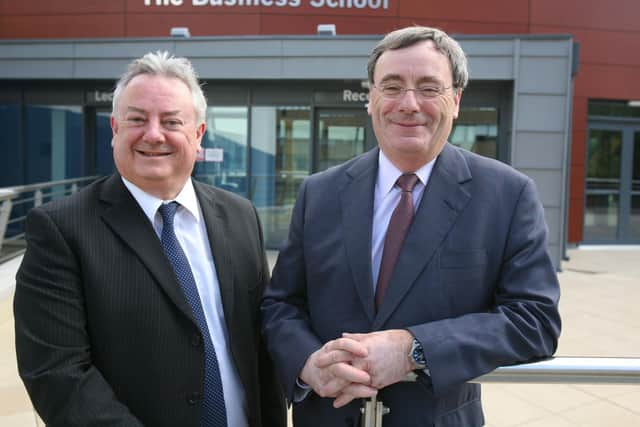Meet the former boss of 3M who remains a down-to-earth Yorkshireman


The first thing Sir George Buckley does during our conversation is stop me in my tracks. “Let’s just keep it George shall we?” he insists. “We don’t need any of that Sir business.”
Despite moving to the US in 1978 to pursue success in what he describes as a land of giants, Sir George still maintains his disarming Yorkshire accent.
Advertisement
Hide AdAdvertisement
Hide AdIt’s not that he isn’t proud of his knighthood, it’s just that this down-to-earth businessman finds all the recognition a bit bizarre.


His name adorns the innovation centre at the University of Huddersfield, a fact that Sir George finds “a bit odd”.
“It feels like I should die soon or something like that,” the former chairman and chief executive of 3M jokes, “but of course it’s a great honour and that’s the way you have to look at it.”
Sir George, an alumni of the university, was named its chancellor last year and recently helped launch the Sir George Buckley Leadership Centre.
Advertisement
Hide AdAdvertisement
Hide AdHe said: “My education at Huddersfield was the foundation on which my career was built as an engineer.
“My career as an engineer became a career as a leader, as a manager. In many ways I owe a tremendous debt of gratitude to Huddersfield University.”
Sir George exudes a sense of optimism and when you look back at his life it’s easy to see why.
He grew up in his grandmother’s house. “She was very poor,” Sir George says. His grandmother split the house into a lodging house and rented rooms out.
Advertisement
Hide AdAdvertisement
Hide AdSir George added: “My mother and father split up when I was a young boy and I was given to one of the families that lived in the house. They became my unofficial foster parents. They raised me until I was 11.
“My mother by that time had remarried and wanted me back. I was made to go live with them. I didn’t want to live with them. I wanted to stay with my foster parents.
“My foster mother had died but my foster father was still around. I loved him very much. He was my real father.”
Sir George was a “sickly child” and in those days was sent to a special school. “They focused on getting you well, not necessarily getting you well educated,” he said. “That’s why I left school without any qualifications.”
Advertisement
Hide AdAdvertisement
Hide AdHe left school at 15 and got a job as an apprentice electrician. Oddly enough, two years later he would end up working for Stanley Tools in Sheffield. Today he is chairman of the board for Stanley Black & Decker.
“It’s bizarre,” he says. “Sometimes I say that it just proves that God has a sense of humour.”
It was a tough upbringing but one that proved very much to be formative. After studying electrical engineering at the University of Huddersfield he was invited by General Motors to come and work for them in the US.
“It felt like I was going to work with supermen,” Sir George says. “Everything was bigger, everything was better. I wasn’t sure whether I could make it in the land of giants. There was some uncertainty or maybe even a little bit of fear.”
Advertisement
Hide AdAdvertisement
Hide AdHe didn’t enjoy working at General Motors and moved to a local electric utility designing power plants.
Across his career, Sir George worked his way up from first line supervisor to president. The climb up the ladder saw him work at Emerson Electric in St Louis and Brunswick in Chicago.
“I always tried to carry my love of engineering with me,” he says. “Even when I became chairman and chief executive of large corporations.”
In 2005, he ended up joining 3M, becoming its chairman and chief executive.
Advertisement
Hide AdAdvertisement
Hide AdIt was no small feat for a boy from Sheffield who was considered too sickly for proper schooling to be joining a company that had made Neil Armstrong’s boots for the moon.
“I gave the first version of the Apple Watch to Tim Cook,” Sir George says. “There was just incredible inventiveness in this company.”
Yet despite his overwhelming success in business, he left 3M after he reached retirement age in 2012. Sir George admits to suffering from what others would describe as imposter syndrome.
He admits to having thoughts along the lines of “I know it’s gone okay for the last 35 years but I’m sure they’re going to find me out tomorrow”.
Advertisement
Hide AdAdvertisement
Hide Ad“It’s not so much about self-belief but you know how fragile circumstances in life are,” Sir George added. “Although it may seem strange that when you have a very successful career you still have doubts about yourself, I think it’s a healthy thing to have.”
The engineer shows no signs of slowing down. In addition to being chairman of Stanley Black & Decker in the US, he is chairman of Smiths plc in the UK. Sir George is also on the board of Hitachi in Japan and is involved with three start-ups.
Away from business he has a hobby collecting and restoring Dinky toy cars. It’s a passion that stems from a childhood where he didn’t have much and had to make his own toys.
“I absolutely loved them but to me they were so expensive because we didn’t have much money,” he says.
Advertisement
Hide AdAdvertisement
Hide AdWhen he bought his first set several years ago from an antiques shop, he admits to feeling a bit silly at first. However, the shopkeeper reminded him that “it’s never too late to have a good childhood”.
His optimism despite the disadvantaged start in life is perhaps what stood him in good stead. “You can’t be a creator or innovator unless you’re optimistic,” he says.
Sir George hopes to help University of Huddersfield’s vice-chancellor Professor Bob Cryan to continue growing what is becoming a global institution.
“But we don’t want to lose our Yorkshire roots,” Sir George says. “We want to be a university that still has a lot of services for local communities.”
Advertisement
Hide AdAdvertisement
Hide AdSo what is his advice to young people who are looking to succeed in their careers?
“My advice to young folks is believe in yourself, have optimism, work hard, have a dream and keep your eyes on the prize,” Sir George says.
Despite a little bit of mid-Atlantic creeping into his accent, it’s clear that Sir George is a proud Yorkshireman. And he is someone that the region itself can be proud of claiming as one of its own.
Curriculum Vitae
Job title: Chairman of the Board; Stanley Black & Decker and Smiths plc
Date of birth: February 23, 1947
Education: B.Sc. and Ph.D. in electrical engineering
Advertisement
Hide AdAdvertisement
Hide AdFirst job: Apprentice electrician, working for NG Bailey, an electrical contractor based in Leeds
Favourite holiday destination: Machu Picchu – but New Zealand or Japan for holidays
Favourite film: The Princess Bride
Favourite song: Genesis, Follow You Follow Me
Last book read: Blake Crouch, Dark Matter
Car driven: Several, but my favourite is a Ford F150 pick-up truck of which I have two
Most proud of: My children and several 13lb trout, all caught on flies
---
Support The Yorkshire Post and become a subscriber today.
Advertisement
Hide AdAdvertisement
Hide AdYour subscription will help us to continue to bring quality news to the people of Yorkshire. In return, you'll see fewer ads on site, get free access to our app and receive exclusive members-only offers.
So, please - if you can - pay for our work. Just £5 per month is the starting point. If you think that which we are trying to achieve is worth more, you can pay us what you think we are worth. By doing so, you will be investing in something that is becoming increasingly rare. Independent journalism that cares less about right and left and more about right and wrong. Journalism you can trust.
Thank you
James Mitchinson